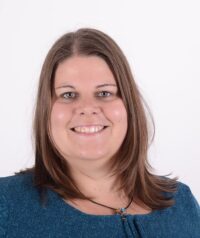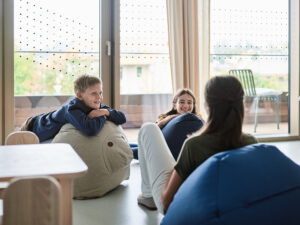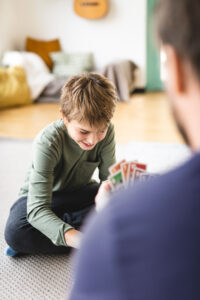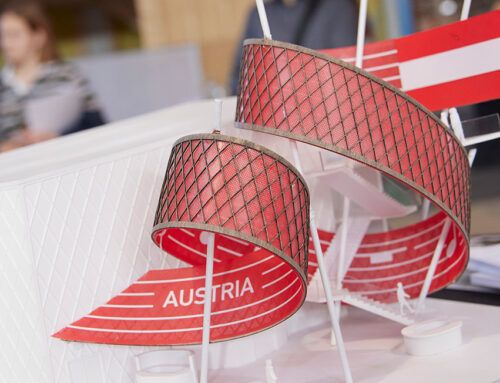Siblings of cochlear implant children: building resilience through focused support
Having a brother or sister with a hearing impairment—or other chronic health challenges—can place significant stress on siblings, sometimes even affecting their own well-being. Providing focused and intentional support helps strengthen their resilience and ensures they receive the care they need alongside their sibling’s treatment.

The CI Center Friedberg (CIC) has been providing CI rehabilitation for children for over 30 years. Several times a year, children come for three to five days of therapy, accompanied by one parent. Siblings who are not under supervision are also welcome to attend.
“When siblings are present, they often feel left out,” says Nina Freiburg, speech therapist and deputy therapeutic director of pediatric therapy at Friedberg. “Parents often share concerns like, ‘My other child is really stressed right now. They ask what happens at the hospital and whether the implant hurts.’ They worry that the brother or sister is being overlooked.”
In response, the team asked themselves, “How can we better support the siblings?” This question led to developing specific programs aimed at addressing the siblings’ needs.
Sibling days at CIC Friedberg
Just like all children with disabilities or chronic conditions, siblings without hearing impairments often require extra attention and support from their parents. When a child has a hearing loss, their brothers and sisters sometimes have to step back, show consideration, and even take on early responsibilities for their sibling. They may also face social or family limitations and sometimes experience feelings of shame or guilt related to their brother or sister’s hearing loss. Often, these siblings need concrete support to help them navigate and cope with the unique challenges within their family.
Recognizing this, the team at CIC Friedberg has introduced regular Sibling Days. During these sessions, experts provide siblings with age-appropriate information and actively work to strengthen their resilience—the ability to adapt and thrive mentally despite difficult circumstances. With this support, the special family situation can transform from a challenge into a meaningful opportunity for growth.
Siblings are special, especially those of CI children

Nina Freiburg experienced CI therapist at CIC – Cochlear Implant Centrum Rhein-Main ©Nicole Effinger
Siblings aren’t just playmates or partners in social development—they hold a unique and powerful role in each other’s lives. Psychologist and educator Prof. Dr. Hartmut Kasten from Ludwig Maximilian University of Munich describes the sibling bond as a “primary relationship,” on par with the connection to a mother. In fact, it’s often the longest-lasting relationship we have. This primary relationship forms early in childhood and plays a major role in shaping personality and future relationships.
The nature of a sibling relationship depends on many factors—birth order, age difference, gender, and, importantly, whether one or both siblings face significant illnesses or disabilities. When a sibling has a serious impairment, it places special demands on the other child. Yet, these unique family challenges can also create remarkable opportunities for growth: stronger family bonds, a sense of responsibility, experience of social support, and recognition from others.
Growing up with a sibling who has a disability can foster social skills, independence, openness, and tolerance. Sometimes, it even inspires career choices. But these opportunities and strengths don’t simply appear—they need to be recognized and nurtured.
Do not underestimate the burden on the siblings
On the other hand, having a sibling with an illness or disability can also be a heavy burden for other children in the family. A scientific meta-analysis examining the mental health of siblings of children with disabilities or chronic illnesses found that these siblings face a higher risk of behavioral and emotional challenges—ranging from increased anger and aggression to low self-esteem, heightened anxiety, and even depression. In fact, about 10% of these siblings may require professional treatment.
These findings cover siblings of children with various disabilities or health conditions. For siblings of children who are “only” hearing impaired, the risks tend to be lower and often relate to the intensity of the affected child’s therapy and care. However, many hearing-impaired children also have additional health issues, and other family stresses can further increase the emotional strain on all siblings.
Make children strong!

Prim. Dr. Robert Weinzettel, Head of the kokon Rehabilitation Center Rohrbach-Berg: "There is always a solution for everything!" ©kokon
The German Federal Agency for Health Education (BZgA) identifies several factors that can put healthy child development at risk. These include child-related factors like genetic predispositions to health issues, low cognitive abilities, or insecure attachment to parents. Family-related factors also play a role, such as socio-economic challenges, single-parent households, parents’ mental health, or having a sibling with special needs. When four or more of these risk factors are present, the chance of developing mental health problems later in life rises to nearly 48%.
While most of these risk factors can’t be easily removed, protective factors can be strengthened to help children become more resilient. Resilience means better adapting to difficult circumstances. According to BZgA, citing research from Freiburg scientists, protective factors fall into three key groups:
- Personal factors: optimism, healthy self-esteem, and active coping strategies
- Family factors: strong parent-child bonds, clear family structure and rules, and positive sibling relationships
- Social factors: support from friends and community, social connections, and dedicated programs for siblings
Prevention for siblings: targeted strengthening of resources!
When a child receives a cochlear implant (CI), the entire family is affected — especially their siblings. While the focus is often on the child with hearing loss, it's just as important to support their brothers and sisters. Early, consistent, and developmentally appropriate support for siblings can make a big difference in how they grow through the experience.
At the Cochlear Implant Center (CIC) in Friedberg, that’s exactly the goal of their “Sibling Days.” This unique program offers dedicated support to siblings of young CI users, helping them not only cope with challenges but also build lasting strengths and deeper emotional awareness. With the right care, children in these situations often develop remarkable empathy, resilience, and a special appreciation for life.
What Are Sibling Days?
Since February 2003, CIC Friedberg has been offering special Sibling Days three to four times a year, always on a Saturday. The program is designed for children aged 7 to 12 — the age group where such support can be particularly effective.
Although the offer is in principle open to siblings of children with all types of disabilities, it’s mostly used by siblings of CI patients — including some with multiple impairments.
Each Sibling Day focuses on three key areas:
- Hands-on learning about hearing, hearing loss, and hearing devices in a child-friendly way.
- Group activities that help children discover and strengthen their personal resources.
- Open conversations where children can express their feelings, realize they’re not alone, and connect with peers who truly understand.
“We have lots of repeat visitors,” says Nina Freiburg, Deputy Therapeutic Director at CIC Friedberg, smiling. “Some children have even made friends here — they exchange phone numbers and keep in touch. That’s exactly what we hope for.”
The program costs €20 per child per session, but this fee doesn’t fully cover the expenses. Fortunately, many generous sponsors help out — and CIC Friedberg also contributes staff and resources themselves. “This project is simply that important to us. A holistic concept includes the siblings, too.”
Rehabilitation for siblings in Austria

The kokon Rehabilitation Center is a protected place where affected children can expect the best possible support. ©Cocoon
At kokon, a children's rehabilitation center in Rohrbach-Berg, Upper Austria, support for siblings is also part of the broader picture. Children undergoing four-week inpatient hearing rehabilitation are supported within a locally integrated concept. Here, siblings can also attend the rehabilitation stay — even if they themselves are not undergoing treatment.
Currently, such opportunities are rarely requested, but Dr. Robert Weinzettel, Medical Director at kokon Rohrbach-Berg, emphasizes that the option exists — and is especially relevant in families of children with complex needs, such as trisomy 21.
At kokon, the rehabilitation model differs from that in Friedberg. It’s structured as a five-week, individualized social-pedagogical program with around 70% group therapy and 30% individual sessions. About a third of these therapies fall under psychiatric rehabilitation. Purely preventive (i.e., non-diagnostic) sibling rehabilitation isn't officially offered in Austria yet — but flexible diagnoses can often make access possible.
Importantly, a separate rehabilitation application must be submitted for the sibling — usually justified by the emotional burden of growing up with a sibling with disabilities. “We try our best to coordinate rehab schedules for both children,” says Dr. Weinzettel. “The sibling’s stay is even one week longer than the CI rehabilitation — but we always find a solution.”
What can the parents do?

The rehab facility for children kokon can also offer simultaneous rehab appointments for siblings. ©Cocoon
In addition to formal programs, there are everyday ways parents can support siblings. CI Austria’s “Summer Days” also provide informal moments for sibling connection — but dedicated resilience workshops for them are still rare. Similarly, while early intervention centers often include siblings in their work, we found very few programs specifically tailored to their needs.
So what can parents do on their own? Here are a few meaningful steps:
- Share child-friendly information about hearing and CI technology.
- Create space for honest, empathetic conversations.
- Plan one-on-one activities that put the sibling first — time just for them.
And sometimes, it’s about recognizing when a sibling needs a break. “If the CI child buries the processor in the sand and the whole family is out searching,” says Nina Freiburg with a smile, “but the sibling says, ‘I don’t want to help right now,’ then it’s important for parents to respect that. They should keep looking — without pressuring the sibling.”
This kind of empathy and respect at home is as preventive and powerful as any therapy or workshop.
When to Seek Professional Support
As always, parents should keep an eye out for signs that a sibling might be struggling emotionally. These can include:
- Extreme withdrawal from friends or social activities
- Rejection of their sibling or even refusing to touch the CI processor
- Sudden drop in school performance
- Strong emotional statements like “I can’t sleep anymore” or “Nobody likes me”
- Aggressive behavior
If any of these signs appear, it’s important to seek help — just as you would for any other mental health concern. Suitable contact points include child or adolescent psychologists, psychiatrists, or psychotherapists.
Special thanks to Nina Freiburg, Deputy Therapeutic Director at CIC Friedberg, for her valuable insights and scientific contributions to this article.
Materials and support services to support siblings as parents
Stiftung-Familienbande.de offers two valuable resources for families and professionals: the manual "Now I'm on it!" for professionals and the parent guide "I'm still there!", both available for free download. While these guides are not intended to replace therapy, they provide families with a wealth of information, advice, and practical suggestions on the topic of siblings.
For child-friendly discussions about hearing, hearing difficulties, and hearing implants, the two Mellie picture books and the Le Dem comic booklets are excellent tools, tailored to different age groups. All of these materials can be found at ZENTRUM HÖREN.
The children’s book Emma helps kids understand that emotions like frustration, anger, sadness, and jealousy are natural and justified. It also emphasizes that they are not alone and highlights the benefits of sharing their feelings with others who face similar experiences. This book was created at CIC Friedberg and is available there.
The Kindertraum Foundation supports siblings under the initiative "I am still there," especially when family finances are tight. Among other forms of assistance, the foundation arranges donated breaks for siblings and a parent, such as stays at Falkensteiner hotels or tickets to events via Oeticket.






